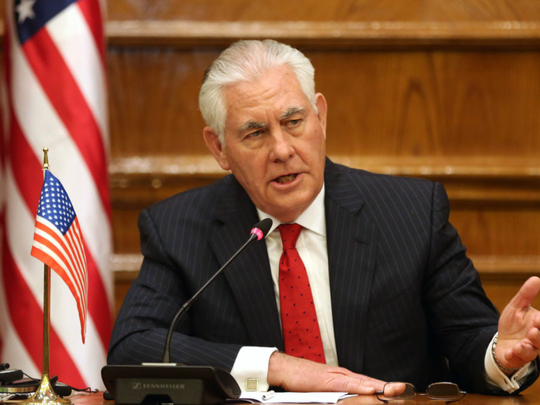
United States Secretary of State Rex Tillerson’s five-country trip to Latin America and the Caribbean didn’t start well.
He kicked off the tour last week with a stop at his alma mater, the University of Texas, Austin, where he gave a tin-eared endorsement of the 1823 Monroe Doctrine, saying that America’s right to block outside interference in the hemisphere is “as relevant today as it was the day it was written”.
In a region that has suffered countless US interventions in the name of the Monroe Doctrine, invoking it as a legitimate guide for American foreign policy is only slightly better than advocating the “white man’s burden”.
For the past year, the administration of US President Donald Trump has consistently offended many of the basic tenets of hemispheric relations. What made the embrace of the Monroe Doctrine so surprising — though it was intended as a warning of creeping Chinese influence in the region — was that the unstated purpose of Tillerson’s six-day swing through Mexico, Argentina, Peru, Colombia and Jamaica was to repair some of that damage from the past year and attempt to shore up regional support for isolating Venezuela’s autocratic government.
While in the end, Tillerson may have achieved his basic goal of securing support for tighter sanctions on the Venezuelan government, it was a narrow victory in a region where the US has broad, varied interests.
In his campaign and first year in office, Trump has managed to hit all the regional nerves. He insulted Mexican immigrants and threatened to build a border wall — an affront not just to America’s second-largest trading partner but also to the rest of the hemisphere. He called the 1994 North American Free Trade Agreement the “worst trade deal” in history — a pact that has helped bring increased wealth and stability to Mexico and beyond. And he suspended the temporary protected status of hundreds of thousands of Nicaraguans, Haitians and Salvadorans, forcing them to return to their countries.
It was no surprise then that even before the suspension of TPS for Salvadorans, a 2017 Gallup poll revealed that only 16 per cent of the citizens in 20 countries in the region had a positive opinion of Trump.
The president dropped another surprise during Tillerson’s tour. At a televised round table in Virginia on February 2, he called out countries that had accepted American anti-narcotics assistance — he didn’t name them but everyone knew he meant Colombia, Peru, Mexico and the countries of Central America. He claimed they are laughing at the United States as they continue to take American taxpayer dollars while still benefiting from the drug trade. The president threatened to cut off assistance to countries that weren’t doing enough to end the illegal production of drugs.
Hollowing out of state authority
The comment was an insult to Washington’s partners in their decades-long war on drugs. All of the countries — three of which Tillerson would visit on his trip — have been solid allies in tackling the narcotics problem. Those governments and their people have borne the brunt of America’s appetite for drugs and its long-standing strategy of focusing on the “supply side” — until the administrations of former US presidents George W. Bush and Barack Obama increased the focus on demand.
Violence, economic upheaval, corruption, organised crime, civil war and the hollowing out of state authority in Latin America have been the results — hardly a laughing matter for any of these countries. As President Juan Manuel Santos of Colombia said with Tillerson standing next to him, “We have lost our best leaders, our best journalists, our best judges, our best policemen in this war against drugs.”
Despite Trump’s latest insult and the clumsy curtain raiser in Austin, Tillerson tried to hit all the right notes on the trip. In Mexico, he emphasised Nafta’s importance to the American economy, proudly declaring that the trade deal employed more than three million American workers and that it just needed to be “updated” (avoiding Trump’s threats to end it altogether). In Argentina, he and his counterpart, Foreign Minister Jorge Faurie, talked about opening the US market to Argentine fruit and vegetables — an important deal for the Argentines.
As the trip progressed it appeared as though Tillerson achieved his narrow goal. The governments that received him appeared willing to declare illegitimate the plan of the government of Venezuela President Nicolas Maduro to hold an early presidential election in April and refuse to recognise any government that resulted from the ballot.
And as Tillerson hopscotched his way across the region, he also spoke more of the possibility of Washington applying sanctions on Venezuelan oil imports and the refinement of Venezuelan crude in the US, an indication that his various hosts were willing to accept stronger efforts to close off Venezuela’s most important petroleum market. By the end, Tillerson quietly boasted that this was now on the table and that Trump would ultimately decide.
Was Tillerson’s trip a success?
While a tougher collective response to Maduro’s march to autocracy and the looming state collapse is necessary and long overdue, the US has a diverse range of interests that go beyond mobilising action against Venezuela. Battling narcotics trafficking with local partner governments, expanding markets for American businesses, promoting broad-based prosperity, and defending democracy and human rights — not just in Venezuela and Cuba but in other countries like Honduras — are equally important.
But the administration’s rhetoric on immigration, free trade and American allies’ commitment to battling the scourge of narcotics — not to mention Tillerson’s embrace of the Monroe Doctrine — have weakened Washington’s leverage throughout Latin America, as the declining popular approval of the Trump administration demonstrates.
Tillerson may have incrementally improved America’s standing in the region, but with all his baggage, he couldn’t fully restore it.
— New York Times News Service
Christopher Sabatini is a lecturer on international and public policy at Columbia and the executive director of Global Americans, a research and advocacy organisation.









